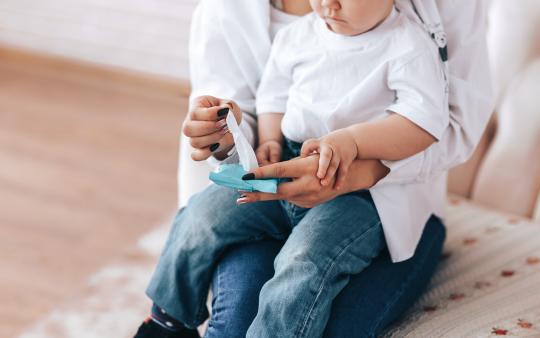Let’s face it: parenting is messy work. It’s no surprise then that many of us reach for those convenient wipes when we’re in sticky (and stinky!) situations. We use wipes to disinfect, remove makeup, and freshen behinds. In fact, it’s estimated that worldwide, we use 450 billion wipes every year.1 That’s 14,000 wipes every second! Unfortunately, like many single-use convenience products, wipes wreak havoc on the environment and contribute to the growing global plastic pollution crisis.
Wipe Out: Reducing the use of plastic
Plastic has become so synonymous with modern life that it’s difficult to imagine a world without it. Convenience foods and goods are especially likely to be packaged in (or made from) plastic: yogurt cups, baby food pouches, and takeout cups, cutlery, and dishware. Plastic, plastic, everywhere.
Wipes are also often made from plastic fibres, such as polypropylene or polyester,2 which means that each wipe you throw away is going to live on in the environment for decades. While opting for biodegradable, compostable, or flushable wipes may seem like the greener choice, it turns out they aren’t much better.
Biodegradable break-down
Here’s the thing: pretty much everything is biodegradable and will naturally disintegrate over time as bacteria, fungi, and microbes break them down into their constituent parts. This goes for wood, food, and yes, even plastic. The variable in question is the length of time a material takes to biodegrade. While a spruce tree is all but completely gone in forty to fifty years,3 plastics are estimated to take up to 1,000 years to decompose.4 More marketable than meaningful, the term “biodegradable” doesn’t give any indication as to whether a wipe is going to break down within a year or languish in a landfill for a millennium.5
Compostable conundrum
Compostable products are a bit of a different story. Composting is an accelerated decomposition process6 and under specific conditions (including factors such as temperature, nutrient ratio, humidity, and air supply), compostable goods are designed to break down relatively quickly into organic material. Composting can happen on a small scale in backyard composters or on a large scale in industrial composting facilities.
Most compostable products available are designed to break down properly in industrial composters, but it doesn’t mean you can dispose of your compostable wipes in your city-run compost program.7 This is because engineered compostable products like wipes may not biodegrade at the same rate or under the same conditions as other materials (food, leaves, etc.), and could end up fouling the final compost product, so always check with your municipality to see what they do and don’t accept.
Toilet twister
So, what about those flushable wipes? Can I flush wipes down the toilet? Sure. Just like technically you can flush toys, cell phones, and that nice watch your mother-in-law gave you for your birthday down the toilet (hello toddler life!). But it isn’t recommended. You should never ever flush a wipe down the toilet. Ever. Contrary to marketing claims, flushable wipes do not break down like simple toilet paper. It doesn’t matter what the package says, do not flush wipes down the toilet.
PSA: Don't flush anything down the toilet except for the Three Ps (pee, poop, and toilet paper)—no, not tampons, sanitary napkins, paper towel, or even facial tissue.
Last year, researchers at Canada’s Ryerson University tested seventy-three different kinds of single-use wipes, seventeen of which were labelled as “flushable”, and not a single one dispersed safely in their sewer system test.8 Flushing wipes down the toilet leads to expensive plumbing problems for homeowners and municipalities. Every year, Canadian cities spend upwards of $250 million9 removing blockages caused by wipes and other non-flushable items. Beyond the cost, blocked sewers lead to sewage backups and overflows that end up in basements or local waterways. Blockages in municipal sewage systems are such a major problem that wastewater treatment officials across the U.S. have begged residents not to flush them10 down the toilet using the hashtag #WipesClogPipes.
So, if you’re still using wipes of any kind, put them in the trash, where they belong.
The Big Plastic Picture
Despite wipe use being in the billions annually, they are only a small part of the massive plastics crisis that the world is currently facing! Since its debut in the 1950s, the plastic industry has generated enough waste to bury Manhattan under two miles (3.2 kilometres) of garbage.11 That’s the height of more than seven Empire State Buildings or nearly six CN Towers!
All the things that industry likes about plastic make it the perfect recipe for environmental harm. It’s cheap, often making it more economical to buy new plastic products instead of repairing or upgrading existing ones; it’s durable, taking anywhere from 10 to 1000 years to biodegrade in the environment; and it’s lightweight, meaning plastic waste often ends up in unintended places like in our parks, lakes, oceans, and ravines.
And when plastics end up in the environment, it isn’t just an eyesore. Studies have shown that more than half of sea turtles have eaten plastic,12 90 percent of seabirds have plastic in their guts,13 and over half of all whale and dolphin species have ingested plastic.14 All in all, nearly 700 species of marine mammals, seabirds, and turtles have eaten plastic.15 In many cases, marine creatures are mistaking disposable wipes and plastic bags for tasty jellyfish,16 which can cause physical damage to the animal’s digestive system or create a blockage, either of which can reduce food consumption and lead to stunted growth and starvation.
Plastic Take-Away
We all have a role to play when it comes to fighting plastic pollution. As individuals and consumers, we can use our buying power to shift away from disposables and towards sustainable alternatives. Consider using a cleaning rag and an appropriate solution to wipe up a spill or disinfect your counters instead. Wash baby’s bum with toilet paper for solids and a soft cloth with mild soap and warm water for residue. And if you’re looking for extra freshness in your toilet habits, a modern bidet attachment is a great idea.
But individual actions will only get us so far. To truly address the plastic pollution problem, we need leadership from government and businesses. In Canada, that means pushing the federal government17 to ban harmful and hard-to-recycle plastics, set mandatory recycling targets for plastic products, and establish mandatory recycled content targets for new plastic goods. In the U.S. there are opportunities to work with local advocacy organizations that are pressing state and municipal governments to take action on plastic. New York State recently moved to ban single-use plastic bags,18 while Berkeley, California adopted an ordinance that requires food businesses to transition away from plastic takeout containers and toward reusable alternatives.19 We need to find ways to disperse and enact these compelling ideas across the country.
For an in-depth read on how much of your plastic recycling actually gets recycled visit ecoparent.ca/plastics.
Globally, both Canada and the U.S. need to work with other large and economically advanced countries (like the G7) to support poorer countries to develop recycling and management programs that keep plastics out of the environment.20 We have been exporting our plastic trash to other countries for decades,21 and it’s our responsibility to clean it up and deal with it ourselves.
As you take your next steps to reduce your plastic use and support important plastic policies, remember: pretty much anything is “biodegradable” or “flushable”—it’s how long it takes and where it ends up that are the concerns.
You may also enjoy: 15 Super-Smart Ways to Reduce Plastic Pollution, Reduce and Reuse More, Recycle Less, and The Green Parent Trap.
For references visit ecoparent.ca/extras/FALL20.



